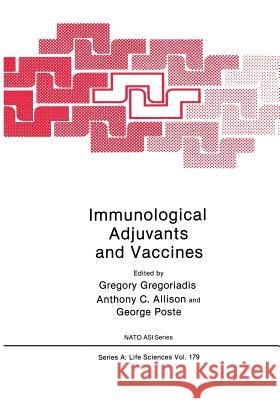Immunological Adjuvants and Vaccines » książka
Immunological Adjuvants and Vaccines
ISBN-13: 9781475702859 / Angielski / Miękka / 2012 / 244 str.
Vaccination, chiefly responsible for the eradication of smallpox and the control of poliomyelitis and German measles in man and of foot-and- mouth, Marek's and Newcastle disease in domestic animals, remains the best answer to infectious diseases. Early vaccines were live wild type organ- isms but these have been largely replaced by attenuated or killed organisms or by purified components (subunits) thereof. More recently, developments in recombinant DNA techniques, the advent of monoclonal antibodies and progress in our understanding of the immunological structure of proteins, have laid the foundations for a new generation of vaccines. For instance, subuni t vaccines have been produced through gene cloning and a number of peptides mimicking small regions of proteins on the outer coat of viruses and capable of eliciting virus neutralizing antibodies, have been synthes- ized. Such vaccines are defined at the molecular level, can elicit immune responses controlling specific infectious organisms and are, thus, potent- ially free of the problems inherent in conventional ones. However, because subunit and peptide vaccines are only weakly or non-immunogenic, they re- quire the presence of immunological adjuvants. These are a diverse array of agents that promote specific humoural and/or cell-mediated immunity responses to antigens. This book contains the proceedings of the 1st NATO Advanced Studies Institute "Immunological Adjuvants and Vaccines" held in Cape Sounion Beach, Greece during 24 June-5 July, 1988.











